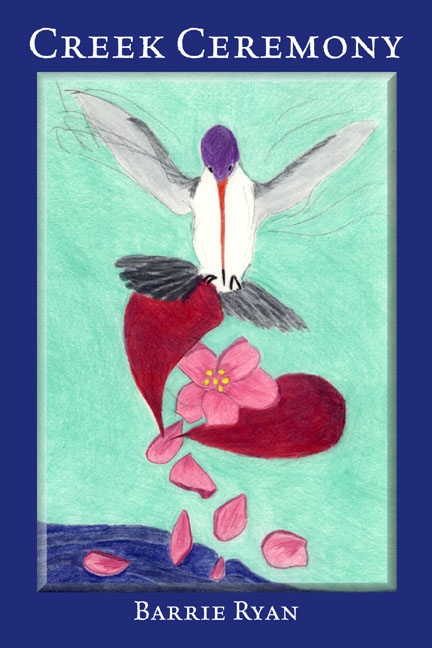
Cradle
Just
touching top leaves
Of the cottonwoods, light.
Creek
dark flow beneath,
A boldness of cold, of fresh,
I stand near as it moves.
From
up creek two plaintive hoots
For the passing of darkness.
I
want to stay still, still
and let the Earth, let the Earth.
I want to be
pressed into,
printed, imprinted
by this sandbank cradling its waterbody,
smell
of mud and dry grass,
light sifting down to lift us.
Always
I want to come from here
when I turn into word traffic
on the asphalt way,
when
I hold
the mute weight
of what the hurrying world
runs over.
San
Juan's day in a year of Drought
June
24, 1999
Like a saint waiting on God
this
summer desert, stretched dry drier
driest will endure till rain.
Out
past where water pours easily
from pipes, where heat is felt
but its merciless
aridity, thirst,
remains invisible
the birds manage best.
Purple
Martins zigzag sky
tracking scarce flying insects.
Doves, Gila Woodpeckers
sit atop
saguaros, suck juice from their ripe
open fruit, whose red looks
like
blood from wounded surrendering columns.
Circling buzzards hint a dark
end
for panting rabbits splayed out in shade.
The
plants, mesquite, acacia,
are still a brave green
but few pods hang.
Closest
to the scorching dirt,
the Prickly Pear, brittle, yellow
slide sideways,
their
greyed root systems
turned up skeletons.
The wash
is a long throat
filled with sand.
No clouds.
Six
poems from
Creek Ceremony
by
Barrie Ryan
Pima
Press
Tucson Arizona
2005
Cover Art: Hand-colored dry point
by
Brigid
Pollack
Barrie Ryan and Brigid Pollock are both long-term members
of Amaterra. We are pleased to present their work as the first Arts section of
our new
e-journal.
To order this book or others by Pima Press, contact:
Pima Press
c/o Meg Files, Chair
Department of English
Pima
Community College West Campus
2202 West Anklam Road
Tucson AZ 85709-0170
The
Stillness of Bees
I'm lulled coming down the bank
into
dry creek this summer morning
with the smell of sycamore musk
deliciously
permeating early heat.
But not for long. Almost instantly
I sense the bees
are missing.
I stop, squint, search for just one
flight, one sign. But none.
Emptiness.
Ominous giant stillness.
I never liked to look directly at the hive
hidden
in that bank hole
behind canyon sage
any more than I could bear to meet
the stare
for long of the horned owls
when I'd sight them hunkered
in
ash or sycamore, watching me closely.
It was their creek I wished to move through
respectfully,
their presences expanding
joy in me, innards of a seed pod about to burst.
It was enough to glimpse bee flight
lifting away or homing down
between
bank and sycamore,
a flickering, a moment's movement
dappled in light and
shade.
Depending on the time of day or season,
a few solos or symphonic
crescendo.
All was well. I could walk on down creek.
The world's blossoms
would be found.
Where hive was hidden
no sign of determined eradication
even
with all the fear of migrating killer bees.
They were far enough from houses
that
I'd like to think few knew
their modest livelihood here--
just glad their
backyard peach tree
turned fruit.
If the bees failed in winter
it would
make more sense. Disease?
But they were here just last week
and all the
weeks of the years
of my creek walking.
Cottonwoods are motionless
so much of winter.
Creek a dry bed seasons without rain.
Coyote voice absent
months at a time.
But these are the cycles of cessation,
the necessary dropping
down and dormancy,
life contracting, gathering itself
until the arias of
motion
can no longer be contained
and burst forth, reborn, in gurgle, rustle,
tremolo.
A dead hive is different.
Some moving intelligence with loft
and
range
has permanently vanished.
Those tiny flying alchemists not present,
not
busy.
What will balance now the gravity
of stolid rocks, rooted seep willow?